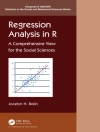Race, Gender, Sexuality, and Social Class, Fourth Edition is an anthology of readings that explores the ways these social statuses shape our experiences and impact our life chances in society today. Organized around broad topics (identity, power and privilege, social institutions, etc.), rather than categories of difference (race, gender, class, sexuality), to underscore the idea that social statuses often intersect with one another to produce inequalities and form the bases of our identities in society. The text features readings by leading experts in the field and reflects the many approaches scholars and researchers use to understand issues of diversity, power, and privilege.
Included with this title:
LMS Cartridge: Import this title′s instructor resources into your school′s learning management system (LMS) and save time.
Don′t use an LMS? You can still access all of the same online resources for this title via the password-protected Instructor Resource Site.
Содержание
Part I • Introduction To Race, Gender, Sexuality, And Social Class: Concepts, History, And Theories Of Difference
A. Concepts and History
1. Defining Contested Concepts — Lynn Weber
2. What Is Racial Domination? — Matthew Desmond and Mustafa Emirbayer
3. Creating a World of Dichotomy: Categorizing Sex and Gendering Cultural Messages — Sara L. Crawley, Lara J. Foley, and Constance L. Shehan
4. The Social Construction of Disability — Susan Wendell
5. The Meritocracy Myth Revisited — Stephen J. Mc Namee
6. Racial Domination and the Evolution of Racial Classification — Tukufu Zuberi
7. The Invention of Heterosexuality — Jonathan Ned Katz
B. Theories of Difference
8. Is Capitalism Gendered and Racialized? — Joan Acker
9. The Social Construction and Institutionalization of Gender and Race: An Integrative Framework — Evelyn Nakano Glenn
10. Critical Thinking about Inequality: An Emerging Lens — Bonnie Thornton Dill and Ruth Enid Zambrana
11. Whose Culture Has Capital? A Critical Race Theory Discussion of Community Cultural Wealth — Tara J. Yasso
12. Queer as Intersectionality: Theorizing Gay Muslim Identities — Momin Rahman
13. Dis/ability Critical Race Studies (Dis Crit): Theorizing at the Intersections of Race and Dis/ability — Subini Ancy Annamma, David J. Connor, and Beth A. Ferri
Part II • Identities Matter: The Social Construction And Experience Of Race, Gender, Sexuality, And Social Class
A. Identity Formation
14. Who Am I? Race, Ethnicity, and Identity — Hazel Rose Markus
15. Gender and Identity — Judith A. Howard and Ramira M. Alamilla
16. The Racial Formation of American Indians: Negotiating Legitimate Identities Within Tribal and Federal Law — Eva Marie Garroutte
17. What Does a White Woman Look Like? Racing and Erasing in Law — Katherine M. Franke
18. “Doing Race”: Latino Youth’s Identities and the Politics of Racial Exclusion — Nilda Flores-González, Elizabeth Aranda, and Elizabeth Vaquera
B. Identities and Social Interaction
19. Using Racial and Ethnic Concepts: The Critical Case of Very Young Children — Debra Van Ausdale and Joe R. Feagin
20. Women Without Class: Chicas, Cholas, Trash, and the Presence/Absence of Class Identity — Julie Bettie
21. Indigenous Identity, Being, and Belonging — Angela A. Gonzales and Judy Kertész
22. A Place in Town: Doing Class in a Coffee Shop — Carrie Yodanis
23. The View From the Country Club: Wealthy Whites and the Matrix of Privilege — Jessica Holden Sherwood
24. On the Limits of “Trans Enough”: Authenticating Trans Identity Narratives — Spencer Garrison
C. Identity Construction and Stigma Management
25. My Body, My Closet: Invisible Disability and the Limits of Coming-Out Discourse — Ellen Samuels
26. Fitting In and Fighting Back: Stigma Management Strategies Among Homeless Kids — Anne R. Roschelle and Peter Kaufman
27. Passing as Black: Racial Identity Work Among Biracial Americans — Nikki Khanna and Cathryn Johnson
28. The Stigma of Brown Skin and “Foreign” Names — Amir Marvasti and Karyn D. Mc Kinney
29. “I Don’t Like Passing as a Straight Woman”: Queer Negotiations of Identity and Social Group Membership — Carla Pfeffer
Part III • Social Institutions And The Perpetuation Of Inequality
A. The Family
30. It’s All in the Family: Intersections of Gender, Race, and Nation — Patricia Hill Collins
31. An Intersectional Approach to Resistance and Complicity: The Case of Racialized Desire Among Asian American Women — Karen Pyke
32. The Home and the Street: Violence Against Queer People — Doug Meyer
B. Education
33. How Tracking Undermines Race Equity in Desegregated Schools — Roslyn Arlin Mickelson
34. Cultural Strengths to Persevere: Native American Women in Higher Education — Stephanie J. Waterman and Lorinda S. Lindley
35. Class Matters — Peter Sacks
C. The Economy and Employment
36. Inequality Regimes: Gender, Class, and Race in Organizations — Joan Acker
37. Are Emily and Greg More Employable Than Lakisha and Jamal? A Field Experiment on Labor Market Discrimination — Marianne Bertrand and Sendhil Mullainathan
38. Families on the Frontier: From Braceros in the Fields to Braceras in the Home — Pierrette Hondagneu-Sotelo
D. Health Care and Medicine
39. Social Determinants and Family Health — Janet R. Grochowski
40. Racism’s Hidden Toll — Ryan Blitstein
41. Structural Gendered Racism Revealed in Pandemic Times: Intersectional Approaches to Understanding Race and Gender Health Inequities in COVID-19 — Whitney N. Laster Pirtle and Tashelle Wright
E. Media
42. Framing Class, Vicarious Living, and Conspicuous Consumption — Diana Kendall
43. Avatars of Whiteness: Racial Expression in Video Game Characters — David R. Dietrich
44. Chinese Maternity Tourists and their “Anchor Babies”? Disdain and Racialized Conditional Acceptance of Non-Citizen Reproduction — Cassaundra Rodriguez
F. Politics and Government
45. Race, Legality, and the Social Policy Consequences of Anti-immigration Mobilization — Hana E. Brown
46. The New Jim Crow — Michelle Alexander
47. (Re)Imagining Intersectional Democracy from Black Feminism to Hashtag Activism — Sarah J. Jackson
Part IV • Power And Privilege Unmasked
48. The Culture of Privilege: Color-Blindness, Postfeminism, and Christonormativity — Abby L. Ferber
49. Five Faces of Oppression — Iris Marion Young
50. Rage of the Privileged — Ellis Cose
51. Stressful Experiences of Masculinity among U.S.-Born and Immigrant Asian American Men — Alexander Lu and Y. Joel Wong
52. How Environmental Decline Restructures Indigenous Gender Practices: What Happens to Karuk Masculinity When There Are No Fish? — Kari Marie Norgaard, Ron Reed, and J. M. Bacon
53. Criminalized Masculinities: How Policing Shapes the Construction of Gender and Sexuality in Poor Black Communities — Forrest Stuart and Ava Benezra
54. Sexual Harassment and Masculinity: The Power and Meaning of “Girl Watching” — Beth A. Quinn
55. Collateral Subjects: The Normalization of Surveillance for Mexican Americans on the Border — Adriana C. Núñez
Part V • Empowerment And Social Change
56. Toward a New Vision: Race, Class, and Gender as Categories of Analysis and Connection — Patricia Hill Collins
57. How White People Can Serve as Allies to People of Color in the Struggle to End Racism — Paul Kivel
58. Doing Anti-Racism: Toward an Egalitarian American Society — Jacqueline Johnson, Sharon Rush, and Joe Feagin
59. It’s Getting Better: Queer Hope, Queer Courage — Jean Halley and Amy Eshleman
60. Policy Steps Toward Closing the Gap — Meizhu Lui, Barbara J. Robles, Betsy Leondar-Wright, Rose Brewer, and Rebecca Adamson
References
Об авторе
Susan J. Ferguson is a professor of sociology at Grinnell College, where she regularly teaches a seminar on the family. Ferguson also teaches Introduction to Sociology, and her critically acclaimed anthology, Mapping the Social Landscape: Readings in Sociology (SAGE Publications, Ninth Edition, 2021) is used in introductory sociology classes around the country. Ferguson also teaches a first-year seminar, courses on the sociology of health and illness and global health, and a seminar on intersectionality and identity. Ferguson has published research in the areas of medical sociology and on the family. Her co-edited book Breast Cancer: Society Shapes an Epidemic (Palgrave, 2000) is highly praised by medical practitioners and health activists alike. Ferguson also has an anthology on social inequality, Race, Gender, Sexuality, and Social Class: Dimensions of Inequality and Identity (SAGE Publications, Third Edition, 2020). In addition, Ferguson is the general editor of a series of research monographs on the family, Contemporary Family Perspectives (SAGE Publications). During fall 2016, Ferguson taught three courses on the inaugural Colorado State University Semester at Sea voyage, including the Sociology of Gender, Introduction to Sociology, and Global Studies. In 2018, Ferguson received the ASA Hans O. Mauksch Award for Contributions to Undergraduate Teaching, and in 2021, she received the ASA Distinguished Contributions to Teaching Award. Ferguson currently is working on several national projects related to the sociology curriculum.












